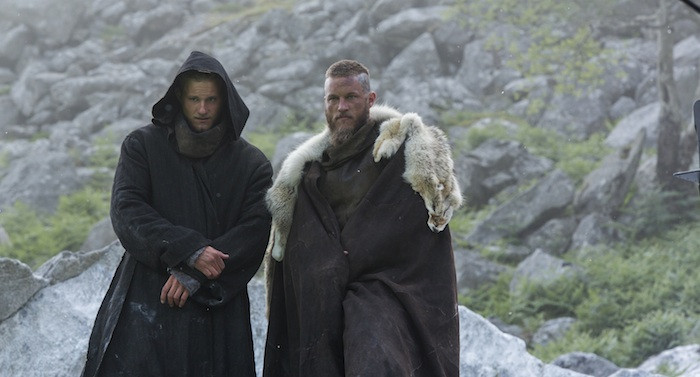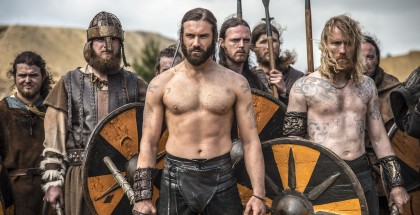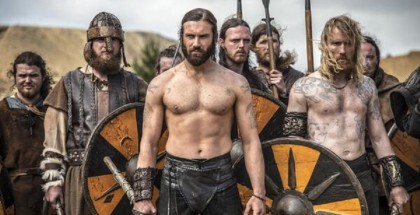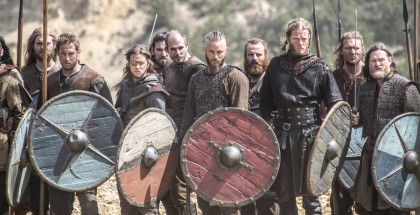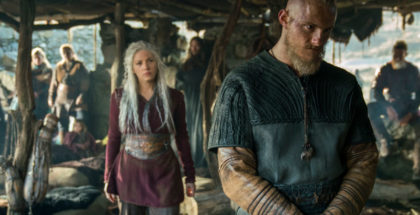Amazon UK TV review: Vikings Season 3, Episode 6 (Born Again)
Review Overview
Athelstan
8Ragnar
8Speaking
8David Farnor | On 31, Mar 2015
“What did he look like?” asks Ragnar in Episode 6 of Vikings, when he hears that Athelstan had an encounter with God. The Christian God, that is. Not a Viking one.
Michael Hirst’s series has always been at its best when placing those two beliefs side by side, so it’s only fitting that after Odin’s visit to Kattegat, we should get an interlude with the deity from the other side of the English Channel. The experiences are tellingly different; where Aslaug had an (ahem) physical meeting with Harbard, Athelstan’s awakening is little more than a beam of light shining through the wall. For the monk, it’s enough to recruit him back to the Lord’s side. Ragnar’s reaction, though, highlights the gap between the cultures more than any visual contrast. “What did he look like?” quizzes Lothbrook. “Did he speak?”
It’s one of many fascinating exchanges between the pair. Ever since the first season, George Blagden’s monk has emerged as arguably the second lead character in Vikings, his wide-eyed sincerity making his journey between the two cultures not only engrossing but also engaging; Travis Fimmel has proven an intriguing protagonist thanks to his infinitely unreadable expressions, but Blagden’s earnest conflict has been our way into the story. We’ve seen him be shocked by sacrifices and sex, ultimately adopt a new religion, and even get crucified by Ecbert’s hordes of Christians. This week, we see Judith subject to similarly barbaric treatment, when her husband discovers she’s with child: the fact that her torture comes across as unnecessary and cruel, rather than sympathetic, speaks volumes for the comparative depth and importance of Athelstan as a character.
It is only right that this week’s episode should be called “Born Again”; his epiphany is a landmark moment for the show’s narrative and warrants its own title. That theme of rebirth is echoed across the episode – Hirst’s skill as a writer has always been to resound big ideas through tiny moments. And so we have Bjorn naming his child with Porunn “Siggy”, in honour of the woman who died to save younger souls; and we have Ecbert positioning Judith’s pregnant as his own bizarre Christ-given heir. The notion of reincarnation, though, is the one that sticks with you come the end credits.
We see Ragnar dispatch an English farmer early on the in the episode, when he learns that their England has been wiped out – a loss of life and land that severs ties with Ecbert’s kingdom once and for all. But for Vikings, as was pointed out in the aftermath of Harbard’s visit, death often begets life. And so the revived Season 3 finally steers itself towards the invasion of Paris – and Floki, angry about the Christians’ betrayal, steers himself on a collision path with his religious opposite. If Athelstan’s journey represents the Anglican equivalent of rebirth, Floki represents the Viking notion of revenge and violence. After a period in which Gustaf Skarsgård’s joker has been reduced to a one-note whiner, it’s a treat to see him become an active agent in his faith once again; a prospect that is as scary as it is bloody, especially when edited alongside Athelstan’s forgiving smiles.
As Lothbrok apparently carries the body of the farmer to a makeshift Christian grave in the woods, and Athelstan seems to move towards bidding his Norse friends farewell, a conversation between them sums up the show’s strength in a simple statement. “We have so much more to talk about,” observes Ragnar. For all the action that the show does so well, Vikings’ strength has stemmed from such conversations. In a world where people are born again, it is sad to think that this could be the last.
Vikings is available to stream exclusively on Amazon Prime Video as part of a Prime membership or a £5.99 monthly subscription – or, if you would also like unlimited UK delivery and 350,000 eBooks available to borrow, as part of a £79 annual Amazon Prime membership.


